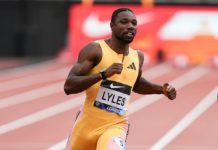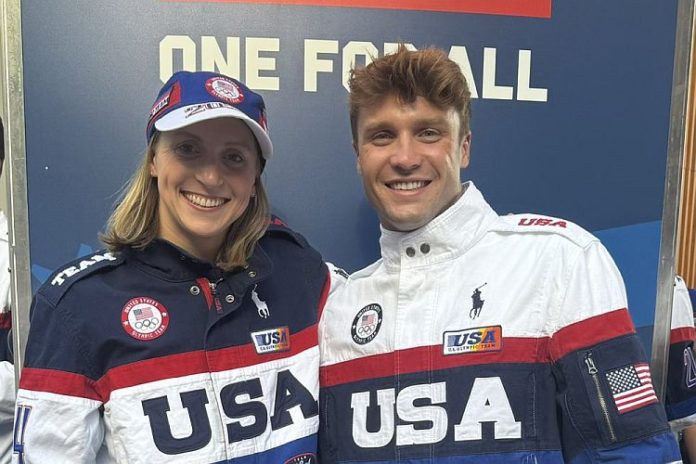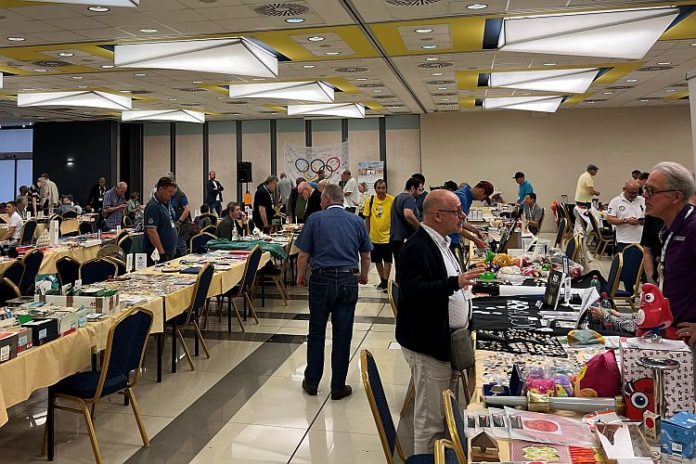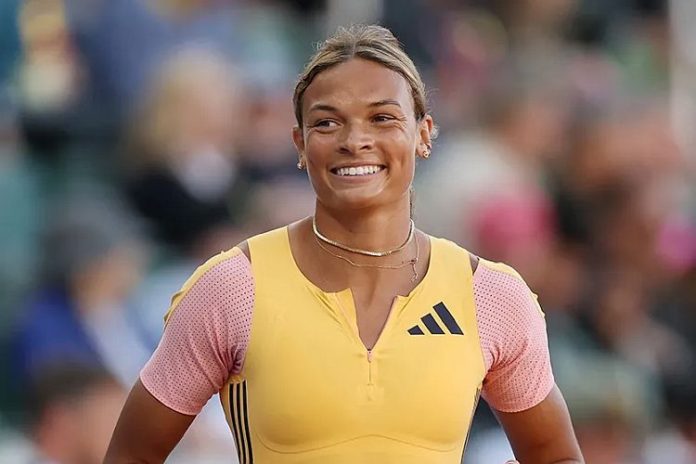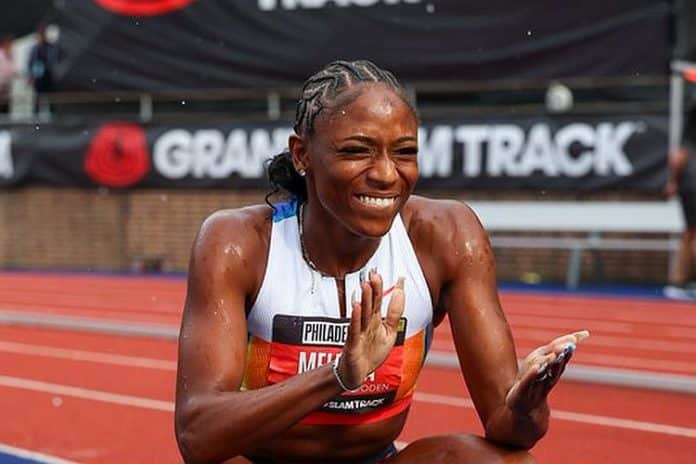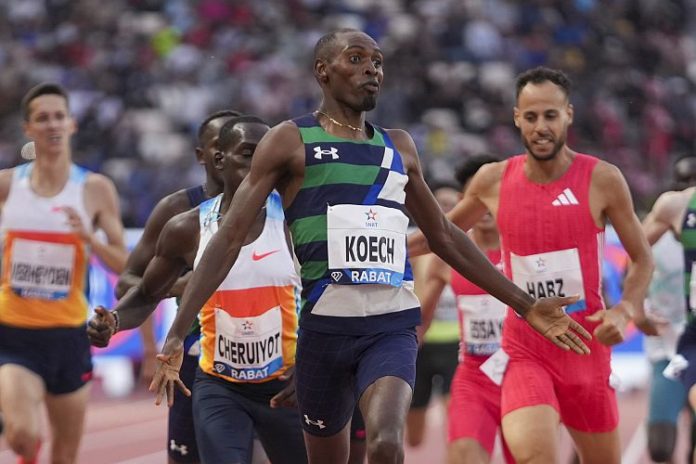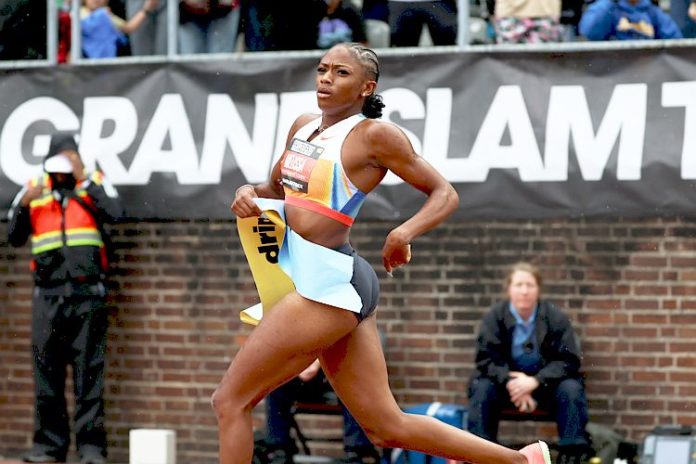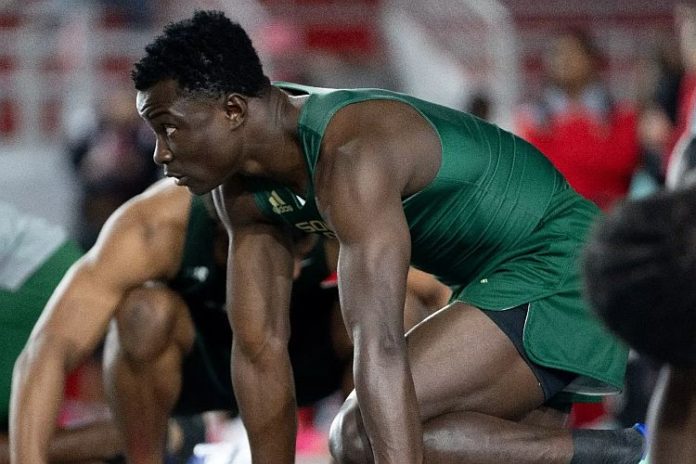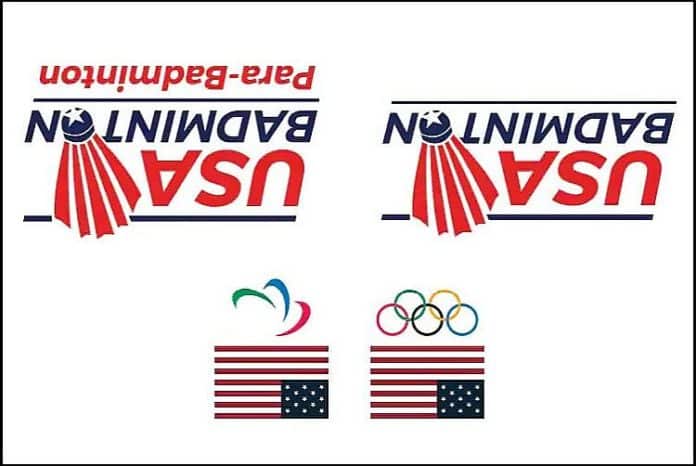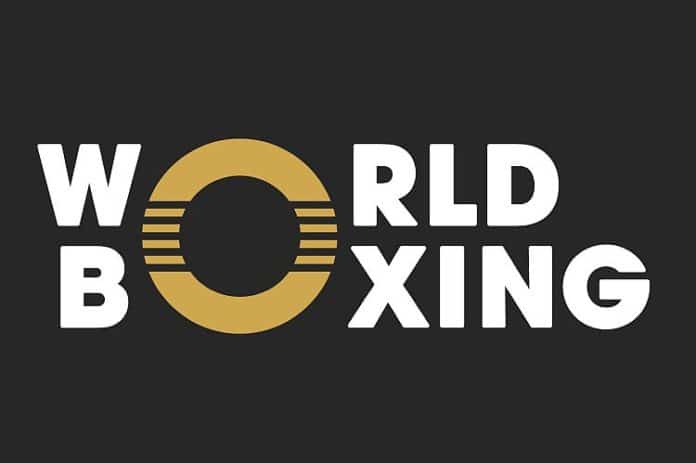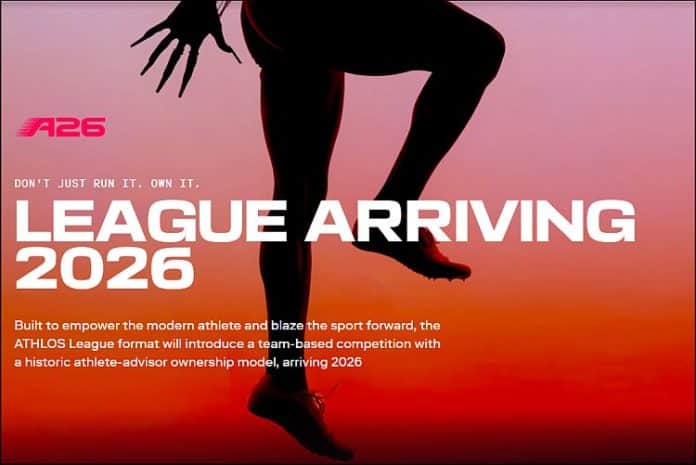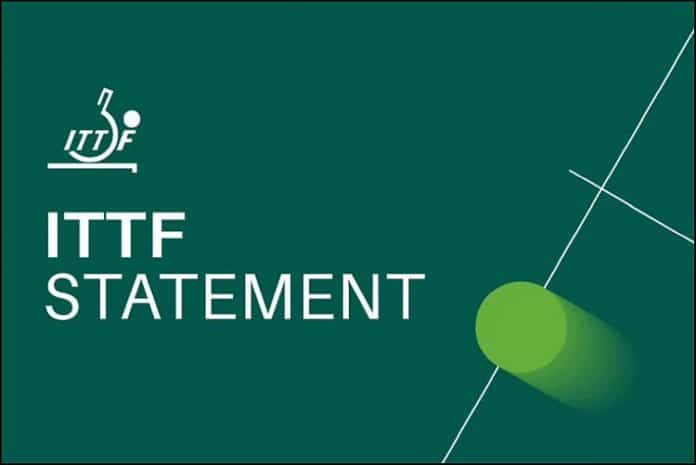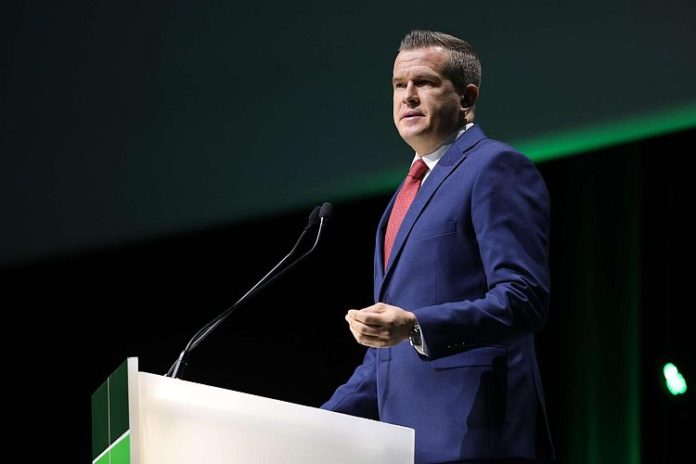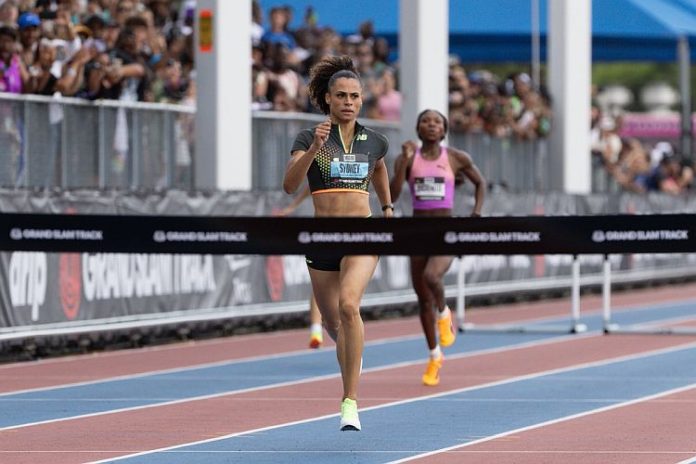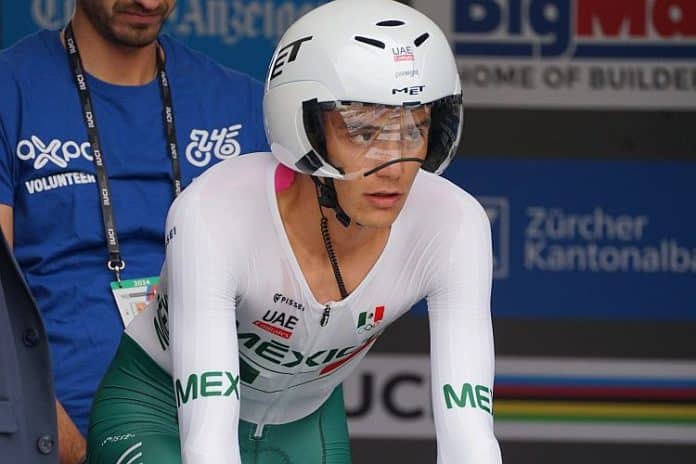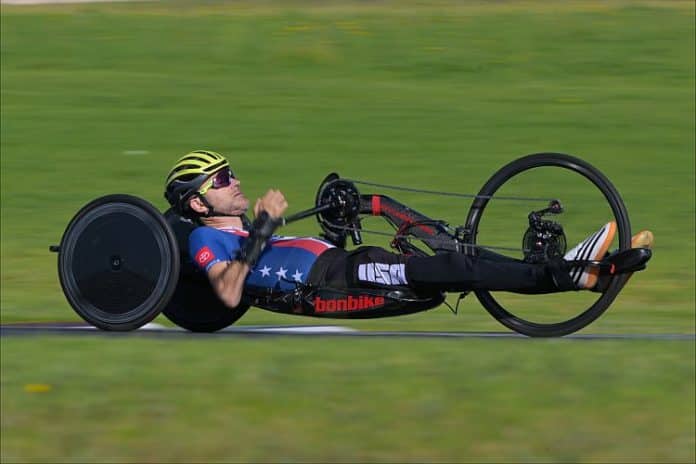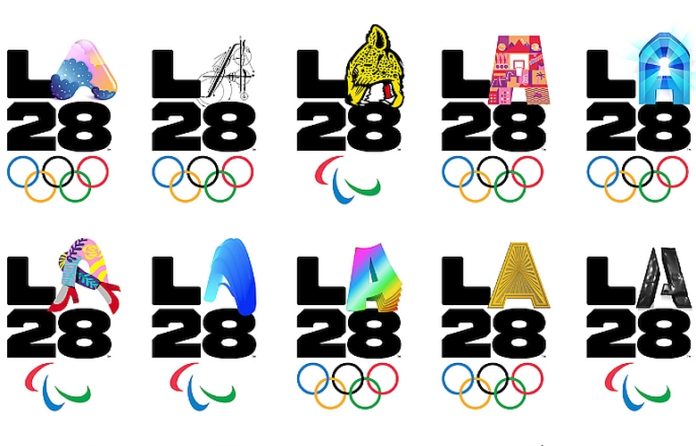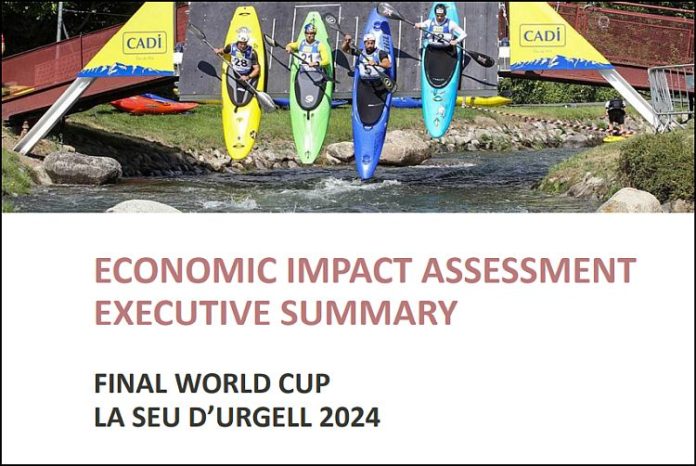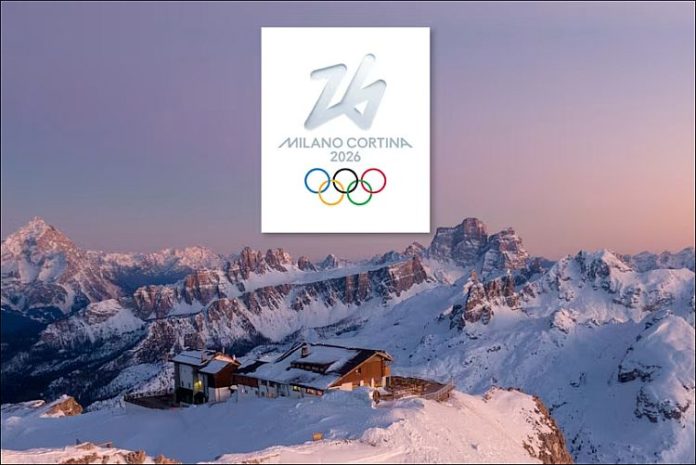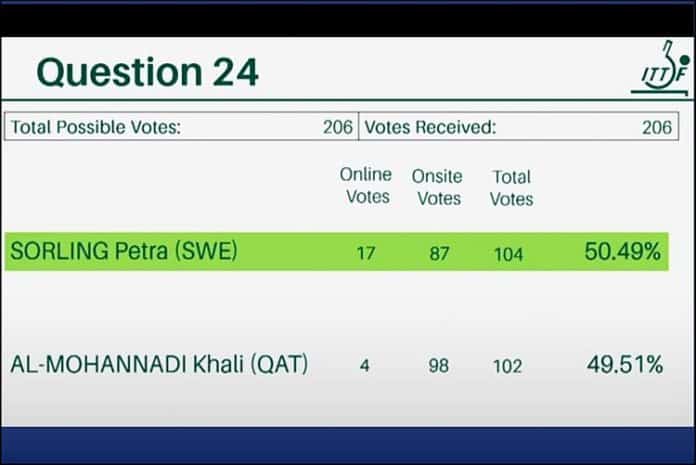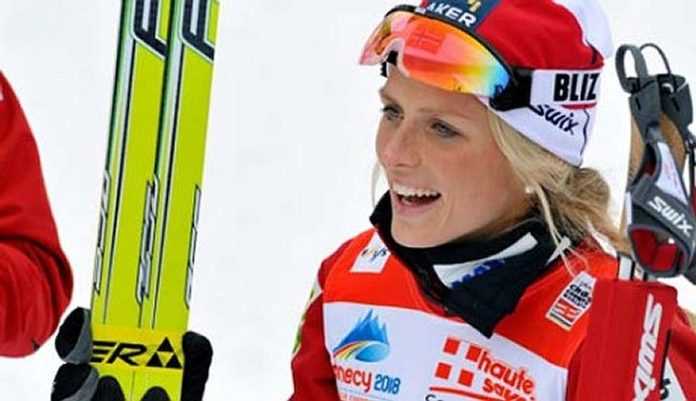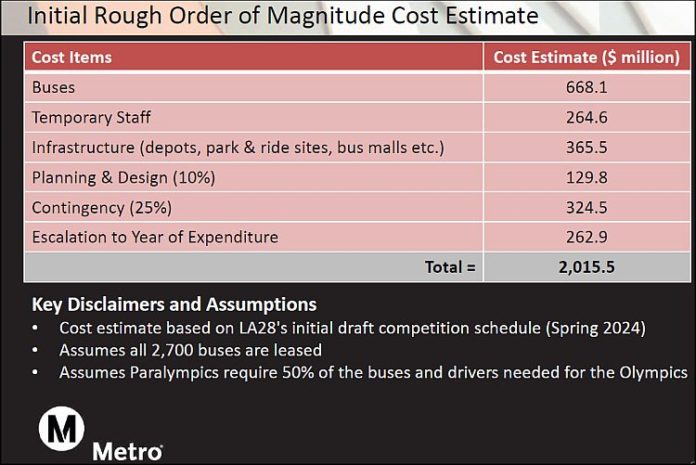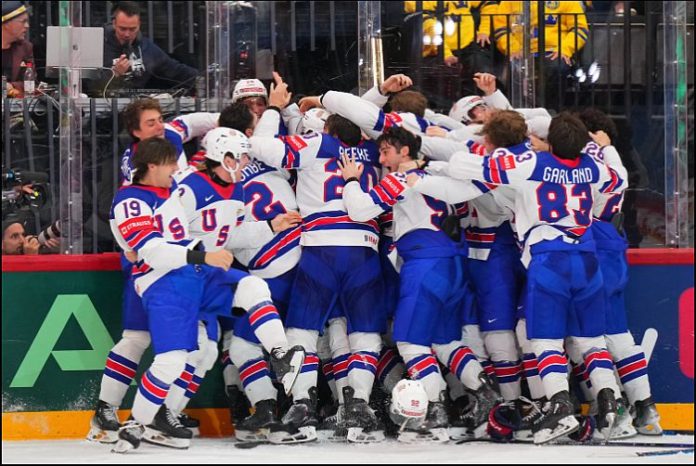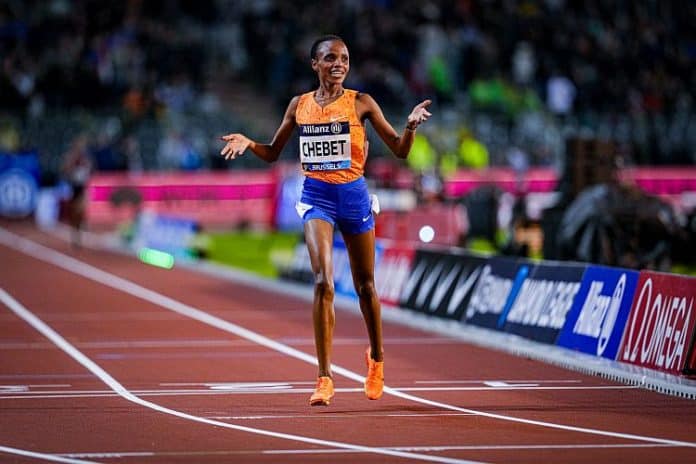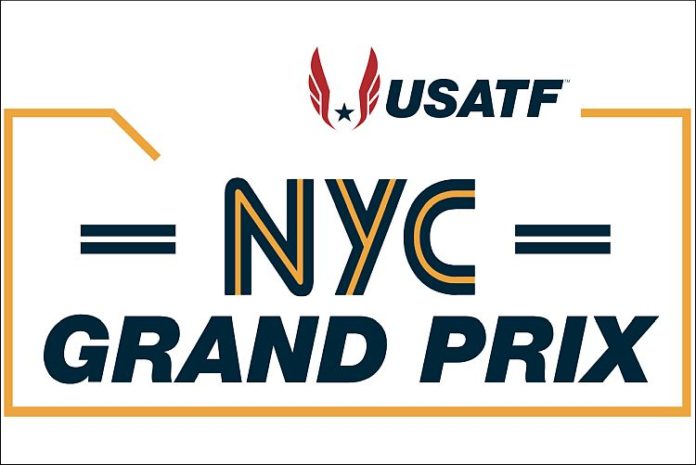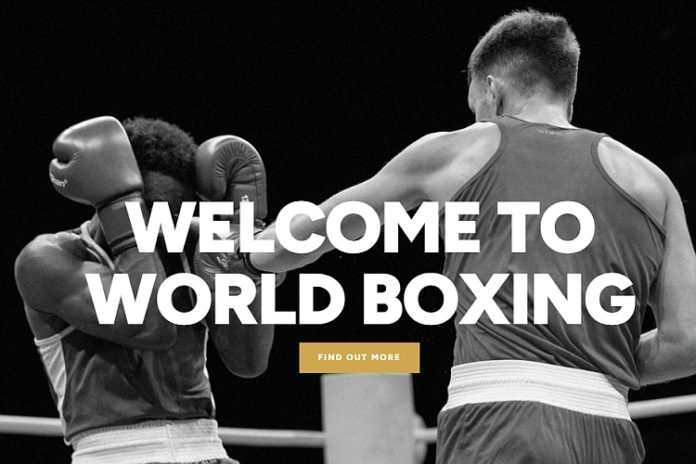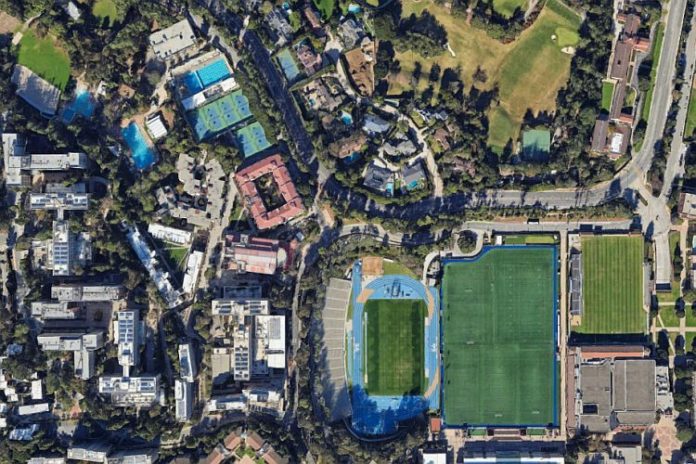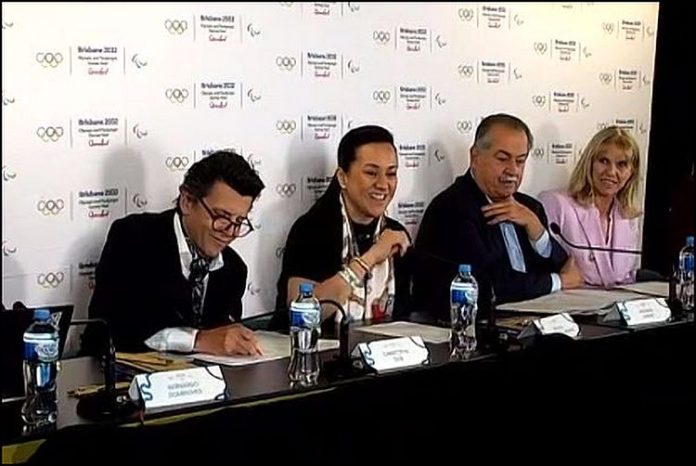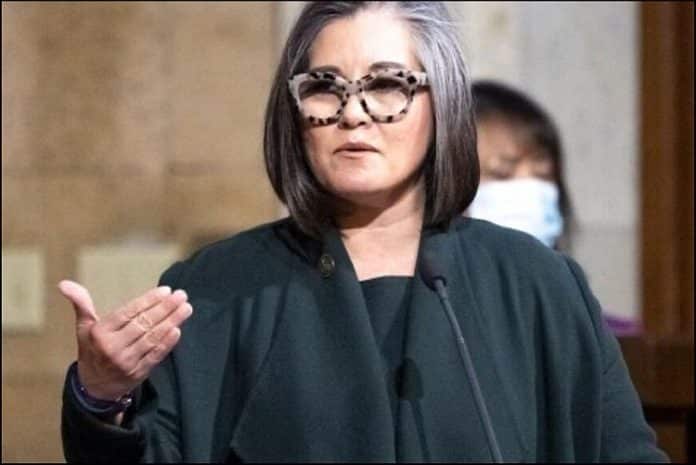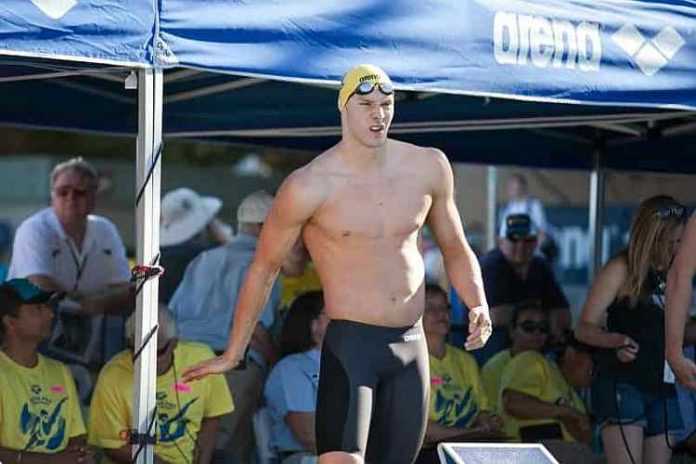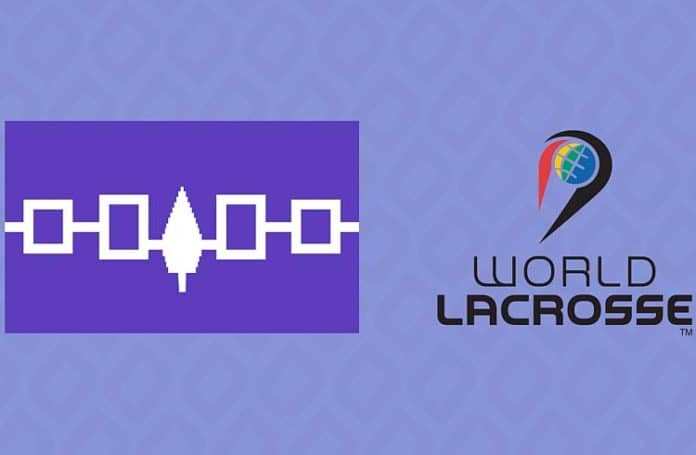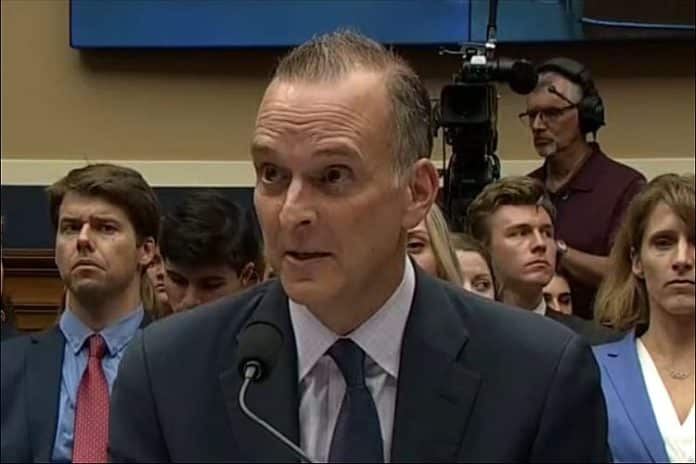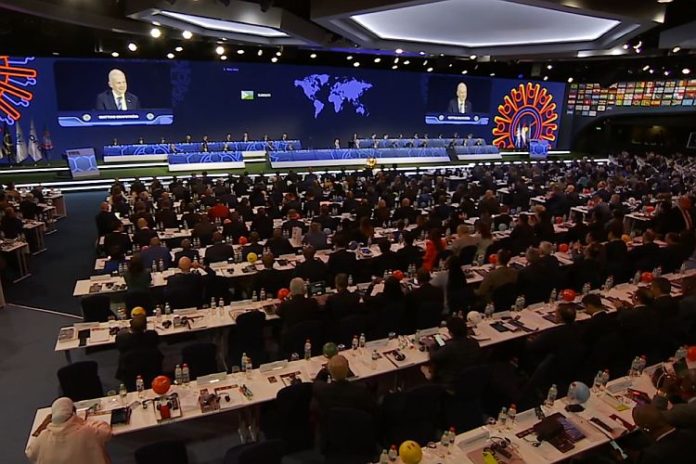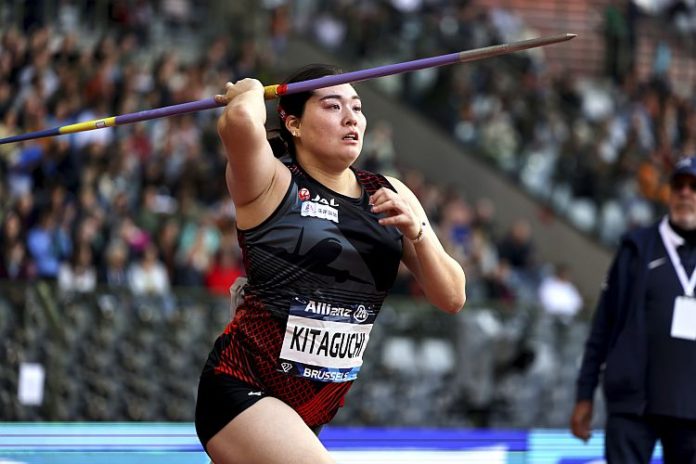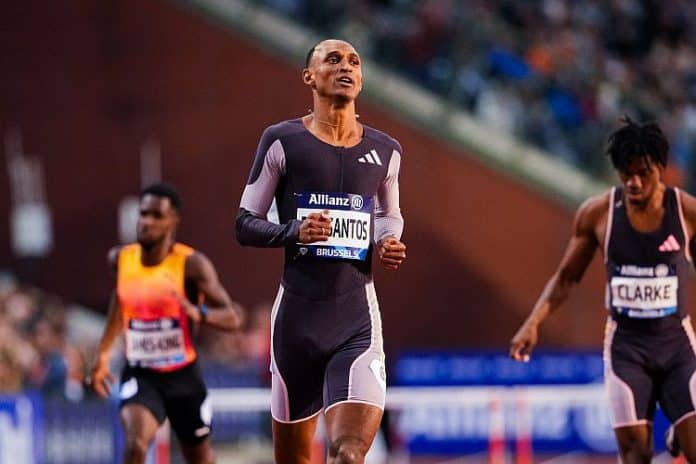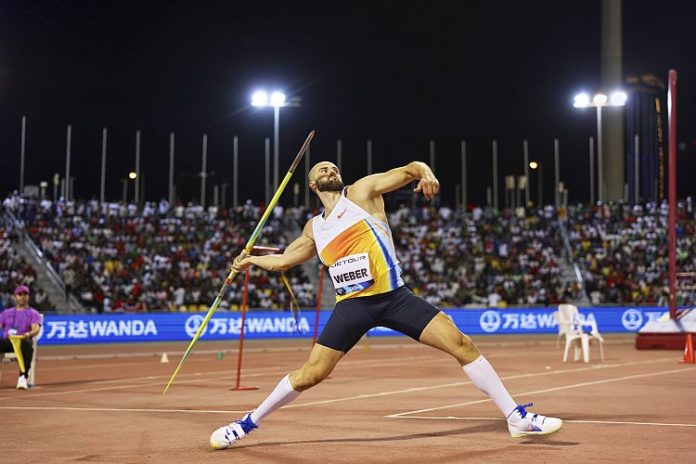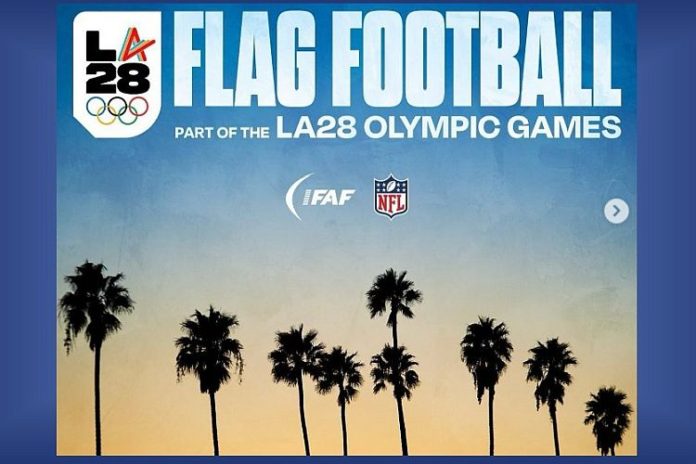★ The Sports Examiner: Chronicling the key competitive, economic and political forces shaping elite sport and the Olympic Movement.★
★ To get the daily Sports Examiner Recap by e-mail: sign up here! ★
≡ THE 5-RING CIRCUS ≡
● Olympic Games 2028: Los Angeles ● LA28 Chair Casey Wasserman shared continued confidence in the organizing committee’s sponsorship sales effort, repeating a projection of $2 billion – 80% of its total target – by the end of 2025.
In an interview with Sportico, Wasserman explained what has been seen as a slow start is more an adjustment to the unique 11-year runway to the 2028 Games after winning the award in 2017:
“People buy when they want to buy, and not when you want to sell.
“No one has ever had an 11-year cycle, from awarding the Games to hosting the Games. Those timelines are nontraditional and produce nontraditional ebbs and flows of all these processes. In many ways, as we go through it for the first time, the whole Movement, in terms of how they think about it and compare it, is going through it for the first time as well.”
He projected some “pretty significant announcements” in major sponsorship categories by the end of July.
¶
Some confusion for 2023 World Championships Boulder bronze medal Do-hyun Lee (KOR) on his travel to the U.S., as his ESTA (Electronic System for Travel Authorization) clearance to come to the U.S. for the weekend IFSC World Cup in Salt Lake City, Utah was canceled on 21 May.
He wrote in a since-deleted social-media post:
“My ESTA was approved on April 28, but it was suddenly denied just two days before my flight — for reasons I still don’t know. Not only me, but the Korean male athletes and our coach were all denied ESTA as well. We’ve done everything we can to get emergency visas, but unfortunately, it won’t be possible before the competition begins.”
However, his authorization was reinstated in time for him to make it to Salt Lake City, where he placed 16th in the men’s qualifying, advanced to the semis and then made the final, where he won the bronze medal!
Travel industry representatives and members of Congress are worried about long processing delays for visas to the U.S. – a growing problem over many years – impacting fan travel to the 2026 FIFA World Cup and the 2028 Olympic and Paralympic Games.
¶
As expected, the Los Angeles City Council approved, by 12-3, an ordinance which will raise minimum wages for workers at hotels in the City of Los Angeles with 60 or more rooms to $22.50 per hours on 1 July 2025 and then again to $25.00 in 2026, $27.50 in 2027 and $30.00 per hour in 2028. If health care coverage is not provided by the employer, a subsidy of $7.65 per hour will be added.
Beyond 2028, the $30.00 rate will be increased by the rate of inflation. The new rates also apply to employees at Los Angeles International Airport.
The Council also asked for a report on impacts of the wage increase after six months and one year.
Any impacts on the 2028 Olympic and Paralympic Games accommodations commitments by hotels are unclear right now; some hotels have indicated they may withdraw in view of price guarantees given to the LA28 organizing committee.
¶
Faced with a $1 billion deficit, the L.A. City Council also approved (by 12-3) a $13.9 billion budget for the fiscal year which starts on 1 July.
To cut the deficit to a workable level, the Council slowed the hiring of police officers and new spending, maintained the elimination of vacant positions, but cut the request for 1,647 layoffs to 650. Initiatives on homelessness were also cut.
Council member Bob Blumenfield said, “We took a horrible budget proposal and made it into one that’s very bad, But that’s an accomplishment. But it is better, and we did save jobs, but the fundamentals are still very bad.”
The budget will be confirmed next week and then sent to Mayor Karen Bass for approval.
● Olympic Winter Games 2026: Milan Cortina ● The Latvian site Sportacentrs.com reported Friday that the International Ice Hockey Federation decided at its annual Congress not to allow either Russia or Belarus to play at the 2026 Winter Games.
The IIHF had previously said that the decision had to be made in concert with the International Olympic Committee with the decision possibly left open until President-elect Kirsty Coventry (ZIM) took office on 23 June.
But the IOC has banned all Russian or Belarusian teams since the Russian invasion of Ukraine in February of 2022, and although it has allowed individual athletes to compete as “neutrals,” it has not wavered from its ban on teams.
The IIHF has not publicly announced any results of its 2025 Congress.
● Olympic Winter Games 2030: French Alps ● The French daily Le Monde reported that a citizens group has filed suit against the 2030 Winter Games organizing committee, claiming that a required “comprehensive environmental assessment” has not been made and forcing a public discussion on the issue.
A parallel suit was filed with the United Nations Aarhus Convention Compliance Committee, essentially on the same grounds; France is a signatory to the 2002 Convention, requiring citizen access to information and decision-making on environmental issues.
● Olympic Games: Future ● The German Sports Confederation (DOSB) has called for bids from German cities or regions by the end of May, and reports last week stated that Berlin, along with four other states, will offer a bid called “Berlin+” for 2036, 2040 or 2044, on Tuesday.
The states of Brandenburg, Mecklenburg-Western Pomerania, Saxony and Schleswig-Holstein would also be involved, assuring a minimum of construction. The city of Leipzig, in Saxony, has talked about a 2040 bid, and North Rhine-Westphalia is also preparing a bid project. Also possible are bids from 1972 host Munich (state of Bavaria) and Hamburg.
While the DOSB has asked for proposals for 2036, 2040 or 2044, the German government has talked more about 2040 – as a celebration of German reunification in 1990 – than a centennial of the infamous Nazi Games in Berlin in 1936.
● Enhanced Games ● USA Swimming sent an e-mail message on Friday (23rd) to its national team members, warning about potential issues with participation in the pro-doping Enhanced Games, now scheduled for 21-24 May 2026 in Las Vegas. The message noted that athlete recruitment is ongoing and stated in part:
“In light of recent announcements related to the Enhanced Games, we are reaching out to express our serious concerns regarding the potential participation of any USA Swimming member in this organization. …
“Please note that any involvement can lead to anti-doping rule violations, as there are rules prohibiting association with certain individuals serving a period of ineligibility for an anti-doping violation. If you are considering participating in the Enhanced Games in any capacity, whether as a coach, athlete, official, or support personnel, or even in a governance or business capacity, we urge you to carefully consider the serious impact an anti-doping violation could have on your livelihood, future career, and reputation within the sport and the Olympic Movement.”
The Enhanced Games announced events in athletics, swimming and weightlifting. The International Weightlifting Federation, which almost saw its sport disappear from the Olympic Games due to doping, issued its own warning:
“The IWF is firmly opposed to the organisation of the 2026 Enhanced games (where the sport of Weightlifting was announced in the programme) and the danger it poses not just to athlete health but the integrity of sport. …
“The Enhanced games, on the contrary, can potentially put the lives of athletes at risk for supposed entertainment and threaten to undermine trust in the future of sport and the performances of clean athletes.”
● U.S. Olympic & Paralympic Committee ● The Sports Business Journal selected USOPC chief executive Sarah Hirshland as its Executive of the Year, joining Scott Blackmun (in 2013) as the only two USOPC chief executives to be so honored.
Hirshland joined the USOPC in 2018 when the organization was in the depths of the Larry Nassar scandal and has overhauled the management team and worked to successfully expand its reach and funding, while maintaining the U.S. as the top medal-winner in the Olympic Games.
In 2024, the U.S. team was the top medal-winner at the Paris 2024 Olympic Games and the 2034 Olympic Winter Games was awarded to Salt Lake City, Utah, with the 2028 Olympic Games now being organized in Los Angeles.
● Weightlifting ● In a strange but certainly not unprecedented display of politics, Mohammed Jalood (IRQ) was re-elected as President of the International Weightlifting Federation for 2025-29 at the IWF Electoral Congress in Riyadh (KSA), with former Pan American confederation head Jose Quinones (PER) elected as the new Secretary General of the federation.
Four candidates had initially been approved to run for President, but Antonio Conflitti (MDA), Tom Liaw (SGP) and Ursula Papandrea (USA) all withdrew, leaving Jalood as the only candidate. He was elected with 168 in favor and six abstentions.
There were eight approved candidates for Secretary General, but seven – including Papandrea – withdrew, leaving Quinones to be elected by 160-0, with 13 abstentions.
In the vote to be IWF First Vice President, there were 12 candidates approved, but 10 withdrew, and Papandrea was re-elected by a 107-66 margin over Attila Adamfi (HUN).
● Wrestling ● Rio 2016 Olympic Freestyle champ Kyle Snyder of the U.S. was removed from the suspension list of the U.S. Center for SafeSport and will be able to wrestle for a spot on the 2025 U.S. World Championships team on 14 June.
Snyder was caught in a prostitution sting in Columbus, Ohio and pled guilty to a reduced charge of disorderly conduct, paid a fine and went through an educational program. He had been temporarily suspended by SafeSport, but his name no longer appeared on its disciplinary database.
≡ SPOTLIGHT ≡
● Ice Hockey ● Since the IIHF men’s World Championship went to a playoff format for the gold medal in the 1992 edition, the U.S. had never played for the gold medal, until Sunday.
With a 6-1 record in pool play, the American men finished second to Switzerland (also 6-1) in Group B and then slammed their way through the quarterfinals and semifinals to again meet the Swiss in Stockholm in the gold-medal match on Sunday.
The final was tight from the start, with both sides active in the first period with 11 shots each, but no scoring. The U.S. offense got going in the second period, out-shooting the Swiss by 17-9, but again no goals. The third period saw the Americans pile up 11 shots to four, but could not score and regulation ended 0-0.
On to overtime, and it didn’t take long with Tage Thompson scoring for the Americans on a smash from inside the blue line to win the title at just 2:02 of the extra period, beating Leonardo Genoni on the U.S.’s 40th shot of the game. American keeper Jeremy Swayman pushed aside 25 shots from the Swiss to get the shutout.
Historic? Yes! Discarding the 1960 Olympic victory which also counted as a “world championship,” it’s the first American gold in the Worlds since 1933, and only the second all-time. The U.S. finished 9-1, outscoring their opponents by 46-18. For the Swiss, it was their fourth loss in a championship match, previously in 2013, 2018 and last year.
The IIHF Directorate awards went to Genoni as goaltender, scoring leader David Pastrnak (CZE) as top forward and American defender Zach Werenski.
In the third-place game, Sweden defeated Denmark, 6-2, in a battle of the co-hosts. It’s the 19th bronze medal for the Swedes in this event and second straight. It was Denmark’s first-ever appearance in the medal round.
In the semifinals, the U.S. blasted Sweden, 6-2, taking a 2-0 first-period lead off scores by Brady Skjei at 6:52 and Cutter Gauthier at 17:13. It was 4-0 after the second, with goals from Conor Garland (11:07) and Mikey Eyssimont at 17:03, and it was essentially over.
Sweden made a rush at the game with two scores in 41 seconds at the 6:32 and 7:13 marks, but Jackson Lacombe made it 5-2 at 11:09 and Shane Pinto got an empty-netter with 4:07 to go for the 6-2 final.
In the second semi, Group B winner Switzerland crushed co-host Denmark, 7-0, also in Stockholm, with Nino Niederreiter scoring in the 10th and 18th minutes as the Swiss raced out to a 3-0 lead. It grew to 4-0 after two periods with three more in the final 20 minutes.
≡ RESULTS ≡
● Athletics ● At the Continental Tour Gold Hanzekovic Memorial in Zagreb (CRO), France’s Olympic eighth-placer Yann Chaussinand extended his world lead in the men’s hammer with another lifetime best at 81.91 m (268-8), with Ukraine’s Paris bronzer Mykhaylo Kokhan at 80.36 m (263-8) for second.
Ethiopia’s two-time World Indoor 1,500 m champ Gudaf Tsegay took the world outdoor lead in the 1,500 m at 3:58.14, beating countrywoman Birke Haylom (3:59.19, now no. 2); American Danielle Jones was third in 4:05.04.
Olympic women’s triple jump silver winner Shanieka Ricketts got the world lead in the women’s triple jump at 14.54 m (47-8 1/2), beating Slovenia’s Neja Filipic (14.42 m/47-3 3/4), now no. 2 outdoors in 2025.
Dylan Beard of the U.S. won the men’s 110 m hurdles in 13.20 (+0.3) as fellow American Jamal Britt was disqualified. Payton Otterdahl won the men’s shot at 21.71 m (71-10 3/4) over former World Champion Tom Walsh (NZL), on the basis of a better second mark, with Roger Steen of the U.S. fifth (21.36 m/70-1).
American Alaysha Johnson won the women’s 100 m hurdles in 12.82 (+1.1) over Luca Kozak (HUN: 12.88).
South Africa’s 2024 World Junior Champion Bayanda Walaza moved to no. 4 on the world list in 2025 with a rout in the men’s 100 m in a lifetime best of 9.94 (-0.3 m/s) over Germany’s Owen Ansah. American Coby Hilton was sixth in 10.41.
Kenyans Denis Kiprotich and Andrew Alamisi moved to nos. 5-6 on the world 5,000 m list at 13:03.17 and 13:03.30, and Slovenia’s 2022 World men’s discus champ Kristjan Ceh got a fabulous lifetime best and a national record of 72.34 m (237-4) to win, no. 3 for the year and placing all alone at no. 6 all-time.
Paris Olympic 100 m champ (and 200 m runner-up) Julien Alfred (LCA) took the women’s 200 m at 22.15 (-0.8).
¶
At the Track Fest at Occidental College in Los Angeles, 2022 World Champion Jake Wightman (GBR) took the men’s 1,500 m in 3:35.26, ahead of American Sam Ellis (3:35.77), and Mexico’s Eduardo Herrera got a national record in the men’s 5,000 m to win in 12:58.37 over Ky Robinson (AUS: 13:05.23). Herrera now stands at no. 5 on the 2025 world list.
U.S. Steeple star Kenneth Rooks, the Olympic silver winner from Paris, took the U.S. list in the event for 2025, winning by more than six seconds in 8:14.25.
Polish Olympian Klaudia Kazimierska – now at Oregon – won the women’s 1,500 m in 4:03.26, ahead of Emily Mackay (4:03.33) and 2025 World Indoor 3,000 m runner-up Shelby Houlihan in fifth (4:04.76). In the third section of the women’s 1,500 m, Tokyo Olympic 800 m gold medalist Athing Mu finished second in 4:10.78.
Australia’s Tokyo Olympic 1,500 m sixth-placer Linden Hall was a decisive winner in the women’s 5,000 m in 14:43.61.
¶
American Brooke Andersen, the 2022 World Champion, grabbed the world lead in the women’s hammer to highlight the USATF Throws Festival in Tucson, Arizona, reaching 79.29 m (260-1) to edge countrywoman DeAnna Price, the 2019 World Champion, at 78.51 m (257-7).
Olympic and World women’s discus champion Valarie Allman won her 21st competition in a row at 68.45 m (224-7). Fellow American Maggie Ewen got a seasonal best in the women’s shot of 19.53 m (64-1) to move to no. 7 on the world list.
● Badminton ● China starred at the BWF World Tour Malaysia Masters in Kuala Lumpur, with – taking the men’s Singles title by 21-11, 21-9 over India’s Srikanth Kidambi, and then top-seed Zhi Yi Wang taking the all-China final from Yue Han, 13-21, 21-13, 21-18.
Chinese teams won the women’s and mixed Doubles, with an all-Malaysian final in the men’s Doubles.
● Canoe-Kayak ● Hungary starred at the second ICF Sprint World Cup was in Poznan (POL), taking eight individual titles, including triple gold-medal performances for Agnes Kiss and Blanka Nagy.
They teamed up to win the women’s C-2 200 m in 42.55 and the C-2 500 m in 1:51.87, well ahead of all others and then combined with Zofia Csorba and Reka Opavszky to take the C-4 500 m final in 1:49.82. Csorba also won the women’s C-1 5,000 m in 25:26.78.
Hungary’s other winners included two-time Olympic silver winner Adam Varga in the K-1 500 m (1:04.01 ahead of teammate Bence Nadas) and Tokyo K-1 1,000 m champ Balint Kopasz in that event in 3:26.42. Balazs Adolf won the men’s C-1 5,000 m in 22:11.47 and Zsoka Csikos took the K-1 5000 m in 22:39.82.
Germany scored wins from Olympic champs Jacob Schopf and Max Lemke in the K-2 500 m and Nick Pickert and Conrad-Robin Scheibner took the C-2 500 m in 1:42.70. The German women’s K-4 500 m team won in 1:32.67.
Olympic champs Martin Fuksa (CZE) and Katie Vincent (CAN) were double winners, with Fuksa taking the C-1 500 m in 1:45.53 and doubling back in the C-1 1,000 m – where he won in Paris – in 3:46.76. Vincent, the C-1 200 m gold winner in Paris, won that event in 47.48 and the C-1 500 m final in 2:02.53, by almost two seconds!
Stars who won in Poznan who also won last week in Szeged (HUN) included Poland’s Anna Pulawska in the K-1 500 m (1:49.90) and New Zealand’s Aimee Fisher in the K-1 1,000 m (3:52.02).
Americans Audrey Harper and Andreea Ghizila had their best finishes in the women’s C-2 200 m (sixth: 44.15) and C-2 500 m in seventh (2:01.96).
● Cycling ● The 108th Giro d’Italia headed into its final week continuing with surprises, with 19-year-old Mexican sensation Isaac Del Toro taking an impressive lead to the final six stages.
On Friday, the 180 km route to Vicenza was mostly flat in the final section, leading to another sprint finish, this time a three-way duel in the final 200 m with Mads Pedersen (DEN) winning his fourth stage in this race in 3:50:24, beating Belgian star Wout van Aert and race leader Del Toro (tie for second). Del Toro extended his race lead to 38 seconds.
Saturday was really crazy, as a crash with about 22 km remaining in the mostly-flat, 195 km ride to Nova Gorica impacted multiple contenders, including no. 2 Juan Ayuso (ESP) and no. 5 Primoz Roglic (SLO), both 1:04 behind the winner.
Denmark’s Kasper Asgreen dropped everyone in the lead pack with 6 km left and won going away in 4:04:40, with the next 16 riders finishing 16 seconds back. But this included Del Toro, who saw his lead expand to 1:20 over Britain’s Simon Yates and 1:26 over Ayuso, with Roglic fifth (+2:23).
Sunday’s 219 km climbing course had opportunities, with Spain’s Carlos Verona attacking with 44 km left and stealing the stage in 5:15:41, a full 22 seconds ahead of Florian Stork (GER) and 23 seconds up on Christian Scaroni (ITA). Del Toro was with a large group of the main contenders, 29 seconds behind the winner, but Roglic fell way back, finishing with a later group at +1:59.
So Del Toro continues in the “maglia rosa” with a 1:20 lead on Yates and 1:26 on Ayuso as his logical challengers. Roglic is now 10th at +3:53.
¶
The four-stage UCI Women’s World Tour Vuelta a Burgos in Spain saw sprint wins for Lorena Wiebes (NED) and Mie Ottestad (NOR) in the first two stages, then Swiss Marlen Reusser blew the race open with a win by 40 seconds in stage three over a major uphill finish to Espinosa de los Monteros.
That gave her a 1:10 lead over Yara Kastelijn (NED heading into Sunday’s Individual Time Trial, on a flat, 9.41 km course to Lezana de Mena. She finished up by winning the Time Trial in 12:51 and took the overall title in 9:25:40. Italy’s Elisa Longo Borghini finished second (+1:51) and Yara Kastelijn (NED: +1:58) was third.
¶
At the UCI Mountain Bike World Series in Nove Mesto (CZE), American star Christopher Blevins got his second straight win and third straight medal of the season, winning the Cross Cross Country Olympic race in 1:26:00, seven seconds clear of Mathis Azzaro (FRA), Lars Forster and Paris Olympic silver medalist Victor Koretzky (FRA), all in 1:26:07.
Blevins also won the Short Track race in 20:07, barely ahead of Koretzky (FRA: 20:07) and Filippo Colombo (SUI: 20:08).
Austria’s Mona Mitterwallner, the 2023 European Games runner-up, took the women’s XCO right at the line over 2023 World U-23 champ Sammie Maxwell (NZL), with both timed in 1:29:32. South Africa’s Candace Lill (1:29:57) was third; Haley Batten of the U.S. took seventh (1:30:50).
Dutch star Puck Pieterse (NED) won a five-way sprint in 20:22, just in front of Evie Richards (GBR) and three Swiss stars – Linda Indergand, Alessandra Keller and Jolanda Neff – all in the same time.
● Fencing ● At the FIE men’s Epee World Cup in Saint-Maur (FRA), the final was all-French, with Alexandre Bardenet taking the title over Gaetan Billa, 15-9. It’s Bardenet’s fourth career World Cup gold, while Billa took his first career World Cup medal. American Oleg Knysh won a bronze, his first World Cup medal. Japan edged Switzerland, 37-36, for the team title.
The women’s Epee World Cup in Wuxi (CHN) saw Alexandra Louis Marie (FRA) get her first career World Cup gold with a 10-9 win over 2022 World Champion Sera Song (KOR). Poland won the team title over Italy, 35-31, with the U.S. team of Hadley Husisian, Leehi Machulsky, Catherine Nixon and Tierna Oxenreider taking the bronze.
The FIE men’s Sabre World Cup in Madrid (ESP) went to two-time Worlds medal winner Sandro Bazadze (GEO), who defeated Enver Yildirim (TUR), 15-8. France took the team title over Hungary, 45-34, while Romania won the bronze by 45-40 over the American quartet of Antonio Heathcock, Colin Heathcock, William Morrill and Mitchell Saron.
The women’s Sabre World Cup in Lima (PER) was a showcase for two-time World Champion Emura Misaki (JPN), with a 15-12 decision against Spain’s 2022 Worlds bronzer Araceli Navarro. France defeated Japan, 45-38, for the team title.
● Sport Climbing ● At the IFSC World Cup in Boulder in Salt Lake City, Utah , Japan’s Mao Nakamura got her first career World Cup gold, taking the final with 84.7 points, well ahead of Zelia Avezou (FRA) and American Annie Sanders, who both scored 70.0, but with Avezou second on criteria.
The men’s final was the third Boulder World Cup win in a row for Japanese teen star Sorato Anraku, who scored 84.4 points to win easily over teammate Sohta Amagasa (69.6) and Korea’s Do-hyun Lee (69.5), with American Colin Duffy, the 2023 Worlds Combined silver winner, in fourth (59.6).
● Table Tennis ● China continued as the dominant force at the ITTF World Championships in Doha (QAT), winning four golds in the five divisions.
Chuqin Wang and Yingsha Sun both won two golds, with Wang taking his first Worlds Singles gold by defeating Brazil’s Hugo Calderano in the final, 4-1 (12-10, 11-3, 4-11, 11-2, 11-7). Sun, the defending champ, took the all-China women’s Singles final, beating 2021 World Champion Manyu Wang, 4-3 (11-6, 12-10, 8-11, 5-11, 12-10, 11-13, 11-7).
Wang and Sun teamed up in the Mixed Doubles, winning their third straight Worlds gold together by 3-1 over Japan’s Maharu Yoshimura and Satsuki Odo, 11-7, 11-8, 7-11, 11-8.
Although beaten in the women’s Singles final, Manyu Wang still got a gold in the women’s Doubles, teaming with Man Kuai to win over Sofia Polcanova (AUT) and Bernadette Szocs (ROU) by 11-6, 11-6, 11-5. It’s the third women’s Doubles Worlds gold for Manyu Wang, who teamed with Sun to win in 2019 and 2021.
The men’s Doubles went to Japan’s Hiroto Shinozuka and Shunsuke Togami, who edged Yun-ju Lin and Cheng-jui Kao (TPE) in a marathon: 11-6, 5-11, 11-7, 6-11, 6-11. It’s the first win in this event by Japan since 1961!
¶
★ Receive our exclusive, weekday TSX Recap by e-mail by clicking here.
★ Sign up a friend to receive the TSX Recap by clicking here.
★ Please consider a donation here to keep this site going.
For our updated, 694-event International Sports Calendar for 2025 and beyond, by date and by sport, click here!












